An elderly homeless Japanese man living in Washington Square does artwork about kittens & internment camps & Hiroshima, crayons & colored pencils & ballpoint pens, his favorite medium only because they don't smear when he lives out in the rain.
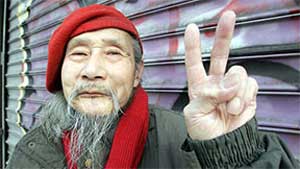 He refuses handouts because he's not a beggar, he's an artist; he sells or trades his artwork to survive. He refuses handouts because he's not a beggar, he's an artist; he sells or trades his artwork to survive.
And if you knew nothing else about him but what was visible in his artwork, he was a man with a poet's soul, & a man who had experienced trauma.
This woman who has sprung into his life with a video camera he trustingly welcomes, as his artwork has a message about injustice & a plea for peace. Any publicity his art receives is good, whether or not he personally gains, & he is soon looking forward to her periodic visits.
His name is Tsumoto "Jimmy" Mirikitani & documentarian Linda Hattendorf perfectly understands this man has got to be one of the best subjects she's ever going to find for a film. Her intent was to film his life in the streets, but then 9/11 brought down the twin towers, & Jimmy was alone in the street breathing toxic dust, simple humanity dictated that she bring him into her tiny apartment.
Thus The Cats of Mirikitani (2006) becomes more a document of a housemate, who constantly does artwork of a rather splendid sort, & tells his life story in bits & drabs. The resulting film received the Audience Award at the Tribeca Film Festival (I almost typoed Treblinka, unfortunately apropos) & it was obtained by PBS's Independent Lens series in addition to dvd distribution.
He was born in Sacremento, California, but raised in Hiroshima, & returned to the United States at age eighteen so he could pursue his interest in the arts instead of going off to war, living in Seattle with his sister until the government began rounding up all citizens of Japanese ancestry.
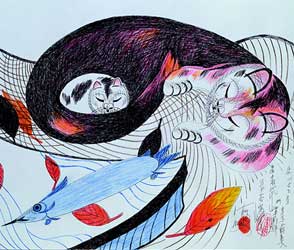 Most of his childhood friends & family were destined to die when Hiroshima was A-bombed, while he resided at Tule Lake internment camp. Most of his childhood friends & family were destined to die when Hiroshima was A-bombed, while he resided at Tule Lake internment camp.
In that horrible era he renounced his American citizenship so when the war was over, he was not released from detention, but sent to a New Jersey frozen foods plant along with other renunciates to serve as slave laborers on twelve-hour nightshifts on a vegetable-sorting assembly line.
A lone attorney, Wayne Collins, struggled to assist the 5,000 renunciates for whom injustice continued even after the war. Collins' efforts after a decade would establish that the renunciates were indeed still American citizens, but Jimmy had been itinerant for so long he could not be found & informed. Having settled in New York in the 1950s to devote himself to his artwork, he never realized his citizenship was intact.
So, having returned to America to avoid military service because, "Not soldier. Artist," then refusing to join other Japanese men in the European theater, again because, "Not soldier. Artist," he devotes his life wholeheartedly to this self-image, having known since preschool that Artist was what he was. And no matter what horrible things the world tossed his way, Artist he remained.
He calls himself Grandmaster. Even homeless he was full of pride & self-worth. When clean & housed, he became such an ideal creative grampa that it's hard to believe he ever had to live in the streets.
Most of his adult life he'd made ends meet as a restaurant cook, & had for a while been Jackson Pollock's personal cook because Pollock loved sushi. When old age put limitations on his ability to generate income, he'd never tried for social security because first of all he refused to turn to a government that so injured him, plus he believed he had lost his American citizenship.
Those sixty years he lived with unrelieved angst, missing his sister who was sent to a different camp & whom he never saw again, lamenting the death of children, mothers, the elderly in Hiroshima his boyhood home -- a man who remained through it all loving, peaceful, outraged, morally upright, & above all talented.
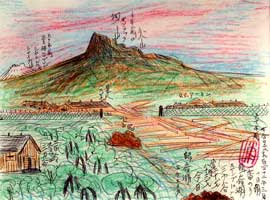 Linda tries to keep her role subdued in the film lest it come off as a peon to her own good deed of taking him in. But their friendship centers the film. She was doing all she could for a friend, rather than remaining the aloof eye of a documentarian, kin to nature photographers who calously film the slow suffering death of animals, or news reporters who bang down the door of people who've suffered catastrophic events only for the sake of their own television ratings. Linda tries to keep her role subdued in the film lest it come off as a peon to her own good deed of taking him in. But their friendship centers the film. She was doing all she could for a friend, rather than remaining the aloof eye of a documentarian, kin to nature photographers who calously film the slow suffering death of animals, or news reporters who bang down the door of people who've suffered catastrophic events only for the sake of their own television ratings.
The bond between Jimmy & Linda is a power in itself, though she's annoyed by him at times, sharing that small space. He worried about her when she was late getting home, because the city is dangerous, & it's annoying to have to consider his state of mind before she can even stay out late for a movie.
She obtained documents through the government including a returned-to-sender letter that had never reached Jimmy, in which his questioned citizenship had been settled in his behalf, though he lived the next fifty years not knowing it. After that it was a cinch to get him social security.
She found him assisted-living retirement housing, an apartment where he could do his art in comfort & have friends over from time to time. She tracked down his sister still in California. His reunion trip to California in 2002 included a memorial service at the Tule Lake camp where so many of his friends died. A bus ride after this ceremony closes the film, & closes it with Jimmy saying that a lifetime of anger seems now to have gone away now, he can let it go -- a moment when tears finally sprang to my eyes.
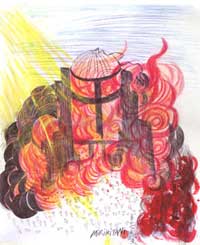 This is a moving portrait, well made though with some of the expected no-budget imperfections or debatable decisions by the director on manner of presentation. There's nothing fancy about the film, no clever edits or dissolves or special effects thrown in thank god. This is a moving portrait, well made though with some of the expected no-budget imperfections or debatable decisions by the director on manner of presentation. There's nothing fancy about the film, no clever edits or dissolves or special effects thrown in thank god.
But a reasonably good film score is a mite too loud & overused. Some moments that would've been stronger with silent observation are aggressively scored, as though the sound editor liked the musical composition more than the text of the film itself, or not believing enough in the material's power or the audience's capacity to understand a thing without musical cues.
So many documentaries nowadays are trashed up with docudrama re-enactments. That's a modern cliche probably imposed by commercialism & PBS being close to the only place to sell such projects. It often seems like PBS can't tell the difference between biography & actors' tableaus, between science & an animated cartoon, or a bunch of guys in cave man make-up.
There's nothing valuable about inserting such crap in purportedly factual films. Hattendorf doesn't too badly fall into this modern documentarian snare. The one forgiveable docudrama ingredient is of a flashback to Tule Lake, an image of a boy in the desert, veritably the ghost of Jimmy's friend who also loved cats, who loved a far younger Jimmy's drawings of cats, but who became sick & died in the camp due to lack of decent healthcare.
The grandmaster is irascible but never mean, critical of the government but almost bewilderingly kind to people. Of samurai ancestry, a trip to the video store in search of Toshiro Mifune as Zen swordsman Musashi Miyamoto is a hoot, as he rejects Japanese films of modern life as no good, no good, no good, then oh boy, Toshiro Mifune! Many of us have that kid still living in us as we grow old.
Hattendorf's film is a clear plain document of a life, neither sentimentalized nor excessively politicized though inherently embracing both sentiment & politics. It shows Jimmy achieving the acknowledgement his talent should have long before provided him, a man at 85 reclaiming aspects of a life taken from him in youth by the American government.
And although this film does not cry out like a wounded John Lennon for peace in our lifetime, on a subtler level, it is film that pleads for an America that values peace & justice. It has a feeling of climax because it ends on Jimmy's personal declaration, whether lastingly true or not, that he has finally found forgiveness in his long-aching heart.
copyright © by Paghat the Ratgirl
|
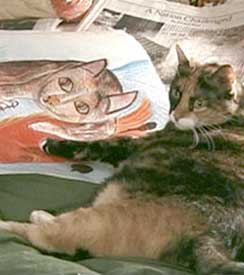
 He refuses handouts because he's not a beggar, he's an artist; he sells or trades his artwork to survive.
He refuses handouts because he's not a beggar, he's an artist; he sells or trades his artwork to survive.

